|
TRANSLATE THIS ARTICLE
Integral World: Exploring Theories of Everything
An independent forum for a critical discussion of the integral philosophy of Ken Wilber
 David Christopher Lane, Ph.D.
Professor of Philosophy, Mt. San Antonio College Lecturer in Religious Studies, California State University, Long Beach Author of Exposing Cults: When the Skeptical Mind Confronts the Mystical (New York and London: Garland Publishers, 1994) and The Radhasoami Tradition: A Critical History of Guru Succession (New York and London: Garland Publishers, 1992). David Christopher Lane, Ph.D.
Professor of Philosophy, Mt. San Antonio College Lecturer in Religious Studies, California State University, Long Beach Author of Exposing Cults: When the Skeptical Mind Confronts the Mystical (New York and London: Garland Publishers, 1994) and The Radhasoami Tradition: A Critical History of Guru Succession (New York and London: Garland Publishers, 1992).
DOUBTING MIND
Great Skeptical Thinkers
Susan Blackmore |
Brian Cox |
Martin Gardner |
Sam Harris |
Christopher Hitchens |
Harry Houdini |
Ray Hyman |
Phillip J. Klass |
Joe Nickell |
James Randi |
Adam Savage |
Eugenie Scott
James RandiVeronica RamirezJames Randi. An amazing man, known in the world of magic and skeptics. The one and only “Amazing Randi”. A magician, escape artist, skeptic, investigator of the paranormal and pseudoscientific claims. One of the most well-known magicians of the 20th century, right next to Houdini himself. 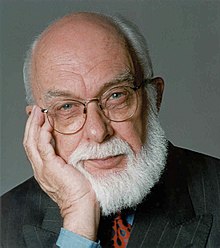 James Randi James Randi otherwise known by his full birth name, Randall James Hamilton Zwinge, was born on August 7, 1928, in Toronto, Canada. As a child, he was very well educated for his age but due to him not attending class sessions with the exception to take exams and quizzes, he became strangely anti-social. Because of this free time, he went to a magic show called, “The Great Blackstone” by a magician named, Harriet Blackstone. James was, in his words, “memorized as the woman was being lifted by nothing!”. It was at that moment, he decided that he was going to become a professional magician. In 1945, at the age of 17, Randi had dropped out of high school and left home to join a circus where he would become a magician and learn the ins and outs of the trade. In the documentary, “The Honest Liar” Randi begins his tale on how he first started with psychic tricks such as mind games. However, before every performance Randi did, he would always disclose a disclaimer so his audience would know his intentions. He would start by saying, “Good evening. I am The Great Randi and I am a cheat, a liar and a charlatan. I will blatantly lie to you but only for entertainment”. He viewed magic as entertainment that people know is not real, yet is fascinating to watch. Randi did many stunts such as escaping from straitjackets, handcuffs, chests, rope—similar to those Houdini once did. However, Randi wanted to one-up him. He wanted to be the best of the best and he did this by learning from Houdini's trial and error. Another magician by the name of Uri Greller was rising to stardom but for the more cunning reasons. He claimed he was psychic and managed to fool the world of science. It was Greller's “tricks” that made Randi think, how can people believe such foolishness? How can this man turn science and scientists into fools? This led Randi to become a skeptic and later on in his career he created a one-million-dollar challenge for people to prove their psychic abilities, with the caveat that they must do so in an honest and transparent way. There have been several attempts though no one has succeeded thus far. So, in 1979, he set out to do an experiment on the public which he called Project Alpha. When starting this project, he enlisted two males by the names of Steve Shaw and Mike Edwards, who would make the public think they were psychics. Randi was working in the background so he made a scientist the lead person in conducting the experiments that were given to Steve and Mike. The two had passed every condition that Randi had placed before them. It was later in 1983 that Randi finally told the public that these two males, Mike and Steve, were not psychics but had developed simple conjuring methods to dupe their audiences. This, naturally, generated much controversy and much criticism—primarily among those who were highly educated since they didn't like feeling they were just pawns and getting duped. It was during the 1980s that Randi became a well-known magician to a larger audience due to exposing or bringing light fake magicians who use their “talent” to trick people into believing that their psychic powers are real. In his book, The Truth About Uri Geller, published on September 1, 1982, he builds a solid case around why Uri Geller is using sleight of hand tricks. For example, Randi exposes how Uri is not using his mind to bend or snap the head of the spoon off, but rather how the spoon is already bent before the show and all he does is rub it at its weakest spot. While continually showing in various arenas (usually on late night television shows) that Uri Geller was a fake, he would also continue to do his tricks and fascinate people while Geller was doing the same. In 1987, Randi attempted to do one of the most well-known escape tricks known as the “Milk Carton.” The “Milk Carton” escape trick is where one locks himself in a metal container filled with liquid and attempts to escape. Yet, as Randi attempted to perform the feat, he failed and almost died. He obtained a deep fracture or depression within his vertebrae. Turning his attention to religious fraud, Randi wrote a book called The Faith Healers. He goes into detail on how people bring magic tricks into the world of religion and thereby dupe unsuspecting believers by a series of rudimentary parlor manipulations. In 1996, Randi co-founded an organization that is named after himself. The company is known as James Randi Educational Foundation which he created to investigate supernatural claims. Throughout Randi's lifetime, he was awarded many awards that recognized his investigations of paranormal and pseudoscientific claims, and protecting science's name and its creditability. One of the many awards he was given was the Joseph A. Burton award in 1989 which recognized his commitment to genuine science against claims of the paranormal and pseudoscience.
Further Reading1. An Honest Liar, November 1, 2016. 2. The Truth about Uri Geller , Prometheus; Rev edition (September 1, 1982) 3. Faith Healers, Prometheus Books (1987) 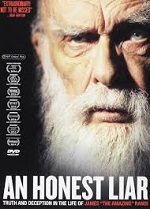 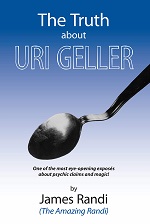 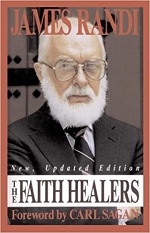 PREFACE | David Christopher Lane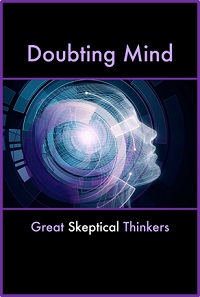
Before the current pandemic altered our day to day lives, the MSAC Philosophy Group had been working on a book entitled, Doubting Mind: Great Skeptical Thinkers, which contained separate essays on a number of notable researchers who champion critical thinking and skepticism when analyzing paranormal claims, such as UFOs, astrology, and various religious claims. The book has now been finished, though it took a bit longer than we anticipated. The word skeptical has too often been conflated with the word cynical. The former term comes from the Greek word skepsis which properly defined means "to look, view, observe." Or, as Miguel de Unamuno explained in 1924 in his book, Essays and Soliloquies, "Skeptic does not mean him who doubts, but him who investigates or researches as opposed to him who asserts and thinks that he has found." To be cynical, on the other hand, indicates that the person is "[pre] disposed to disbelieve or doubt the sincerity or value of social usages or personal character or motives and to express it by sarcasm and sneers, disparaging of the motives of others, captious, peevish." Therefore, it is important to understand that a skeptic is not one who ad hoc dismisses borderland ideas, but is one who is willing to go the extra mile to gather more (not less) information about any given phenomenon. As I have often remarked (to the obvious consternation of certain cult followers), we, humans, are too gullible when we accept miraculous claims without further investigation. We are cheap sluts for the paranormal, believing too easily in conspiracy theories that defy the known law of physics. There are many reasons why this is so, but I suspect that in a world where everything eventually eats one another to survive (whether it be a vegan eating plants or a carnivore eating meat), any organism that can develop a buffering illusion to survive such a horror show has an evolutionary advantage over others that cannot. This came into sharper relief for me this past week as I watching the British made television mini-series, War of the Worlds, where in one particularly poignant scene a mother who has just witnessed the death of her children at the hands of an alien species realizes that there is no point in continuing to live in such a horrific environment. She opts to shoot herself and the viewer instead of being shocked perfectly sympathizes with her decision. Nature is a madhouse if looked at objectively and therefore it is not surprising that we have evolved all sorts of mental defense systems in order to live long enough on terra firma to pass on our genetic heritage. Since we are the survivors in this boiling cauldron of eat or be eaten, we have inherited a variety of tools to ward off the true existential dread that can overcome any being that becomes too keenly aware of how this DNA game plays out. I mention all this as a necessary preface, since no matter how well versed we may become in science (and trained to become good doubters, in the positive sense of that term), we still retain at the core of our beings a deeply emotional component that defies a purely rational or logical way of being. We may act like scientists from time to time, but we are not scientists in the long term. We are vulnerable creatures and our myths and our fairy tales will persist even if we opt for agnosticism or atheism, though they may take on a different color and hue and justifications. Thus, this book provides us with but a small glimpse of how to think more rationally and critically, despite the sobering realization that we cannot be great skeptics all the time.
Comment Form is loading comments...
|